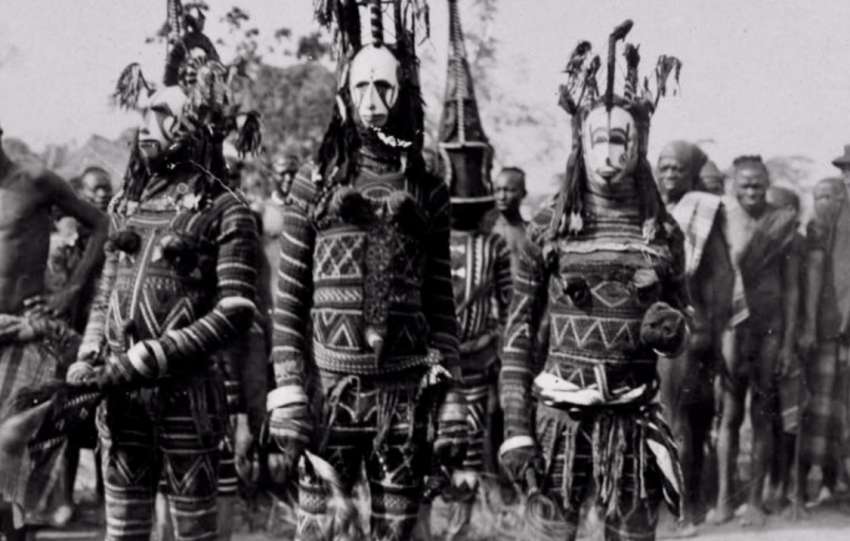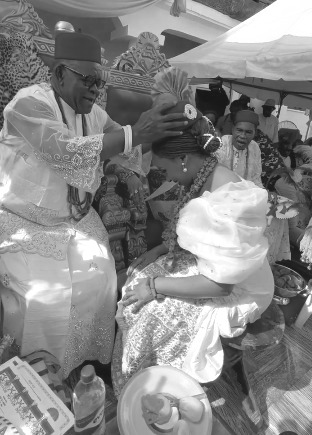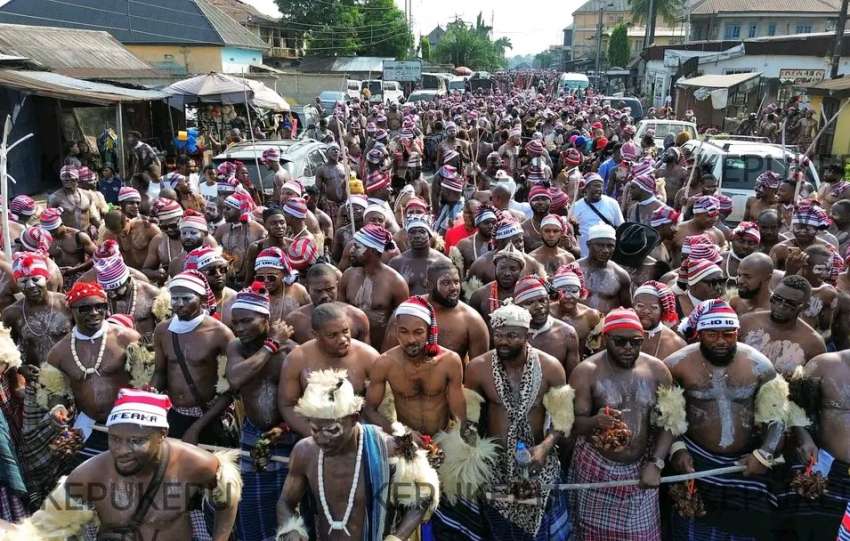A woman from the Amudo community in Awka, Madam Lucy Enujioke (Agbe-Oyibo), attended a burial in Abatete, Anambra State, where she enjoyed a performance by a male music group, Igba Ifeanyi Okafor.
She became inspired and proposed adapting their style for herself and women. With their agreement, she gathered her age-grade group from Awka, and they began rehearsals under guidance from the male group. The women mastered drums, bells, and flutes, with Madam Lucy becoming the leader and soloist. She also introduced traditional instruments like ọkpọkọlọ, ịchaka, alo, udu, and the recorder, creating a unique women’s musical style.

Amokwe Community TV YouTube channel
Before, the original music did not have a choreographed dance; people just danced anyway. But in Odezuruigbo, they added good dance steps, arranged choreography, and organised themselves very well. They would select only the best people to perform.
That is how the group grew. They launched their first performance in 1974. People came from different places, including Ifeanyi and his group. It was interesting for everyone. From that time, Odezuruigbo began to perform in Awka and even outside Anambra State. However, as years passed, many of the original members began to age, and some died. Activities then slowed down.
Still, Madam Lucy refused to give up. She opened membership to young women, even those who were not from Awka. This time, the group became more inclusive. They changed their name to Odezuruigbo Cultural Dance, with the slogan: Nwanne di na mba—meaning there is unity even among strangers. Women from different Southeastern states joined. Madam Lucy taught them everything: how to play and how to dance.

In 2003, they launched again, this time bigger and better. New officers entered, and rules were put in place. One of the strictest rules is that any woman who is rude to her husband, if that is investigated and confirmed, will be evicted from the group. This shows that the group is not only focused on performance but also on morals and community values.
Odezuruigbo is not just a dance group. It is music, culture, and unity brought together by women who refused to stay silent or limited. By copying another community’s music, they created their own identity, empowered fellow women, and promoted togetherness. Today, Odezuruigbo remains one of the proud symbols of how women sharpen culture with strength, talent, and purpose.
Odezuruigbo is a strong traditional dance group in Awka, in southeast Nigeria. Even though lots of old music is gone, this group is still strong. They make music that touches different parts of Awka people’s lives, like how they relate with each other, how they live their culture, how they learn things, how they handle politics, and even how they make money. It is not just for entertainment; it teaches, corrects bad behaviour, and brings people together.

Amokwe Community TV YouTube channel
In Igbo land and many African places, music is not just for play. Before the white people entered, music was how they controlled society, taught morals, and held the community together. As Vidal (2016) said, music helps maintain order and punishes the wrong people. Even though some of these old songs have faded, Odezuruigbo still carried the tradition forward.
Music and dance help bring people together. Anytime Odezuruigbo perform, people from all corners come, old, young, rich, or poor. Mrs Enujioke, the lead singer, would use songs to tell people what is good and what isn’t. She would praise good behaviour and expose the bad ones. For example, during burials, their music would calm down the people who had lost a loved one. In other ceremonies, their song would talk against bad things like land issues, stealing, and snatching another person’s wife. Folk music has the power to change how people think.
Odezuruigbo music is not for fun. It educates people about the Igbo culture. In marriage, for instance, they would sing a song that taught the husband and wife how to love and respect each other. The message would touch even the older people.

One good thing is that they do not chase outsiders. Even if you are not an Awka person, you could join if you are serious. This shows that Awka people are welcoming and peaceful. It is one of the reasons why people like Odezuruigbo very much. Even in a big state event like the Anambra New Yam Festival in 2018, they invited the group to perform.
Odezuruigbo’s cultural dance shows that traditional music is a big part of Igbo life. It teaches, unites, and sharpens the way people live. Through song, people learn how to behave, and culture continues. This kind of traditional music is supposed to be encouraged so that our heritage does not die.
References
Alor, P. E. S. (2002). The attitude of Nigerians towards music education in a technological era. In J. E. Nnadi (Ed.), The humanities in contemporary Nigerian education.
Okpala, H. N., & Nwamara, A.-I. O. (n.d.). The socio-cultural implications of Odezuruigbo cultural dance music in Awka, Awka South Local Government Area of Anambra State.
Vidal, T. (2016). What role for Nigerian indigenous music in today’s changing times? Journal of the Association of Nigerian Musicologists, 10, 1–22.



